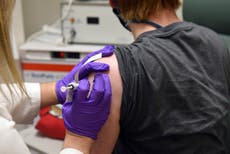The Independent's journalism is supported by our readers. When you purchase through links on our site, we may earn commission.
Covid vaccine: One in five reluctant to get coronavirus jab, survey suggests
Reasons given for not wanting to take part include believing pandemic is a hoax or fear of implanted microchips
Your support helps us to tell the story
From reproductive rights to climate change to Big Tech, The Independent is on the ground when the story is developing. Whether it's investigating the financials of Elon Musk's pro-Trump PAC or producing our latest documentary, 'The A Word', which shines a light on the American women fighting for reproductive rights, we know how important it is to parse out the facts from the messaging.
At such a critical moment in US history, we need reporters on the ground. Your donation allows us to keep sending journalists to speak to both sides of the story.
The Independent is trusted by Americans across the entire political spectrum. And unlike many other quality news outlets, we choose not to lock Americans out of our reporting and analysis with paywalls. We believe quality journalism should be available to everyone, paid for by those who can afford it.
Your support makes all the difference.One in five people would be reluctant to take part in the NHS Covid-19 vaccination programme, a survey suggests.
Two-thirds (67 per cent) said they would be either "likely" or "very likely" to volunteer for a coronavirus jab, while 23 per cent of respondents said they would be unlikely to put themselves forward for a vaccine.
A further 10 per cent of people said they were undecided, the poll by Savanta ComRes for ITV News found.
Notably, the survey found there was a greater willingness to get a jab if the vaccine programme remained voluntary, as the government has said it will.
The proportion of people who said they were willing to get the jab dropped to 65 per cent when told to imagine a scenario where the vaccine was mandatory.
Among those who expressed reluctance to take part, a fear of potential side effects was cited as the most common reason, followed by a mistrust of pharmaceutical companies, the government and the medicines regulator.
One in 10 of those who said they were reluctant to take part said they believed the pandemic was a hoax. Another 12 per cent said they believed vaccinations contain microchips or other devices.
The survey involved 2,090 UK adults and was conducted between 20 and 22 November — before the government announced that the Pfizer/BioNTech vaccine had been approved for use.
The jab has been shown in studies to be 95 per cent effective and works in all age groups.
The Department of Health and Social Care said the vaccine would be made available across the UK from next week.
The UK has ordered 40 million doses of the vaccine, enough to vaccinate 20 million people.
Around 10 million doses will be available for use in the UK shortly for priority groups, including healthcare workers.


Join our commenting forum
Join thought-provoking conversations, follow other Independent readers and see their replies
Comments